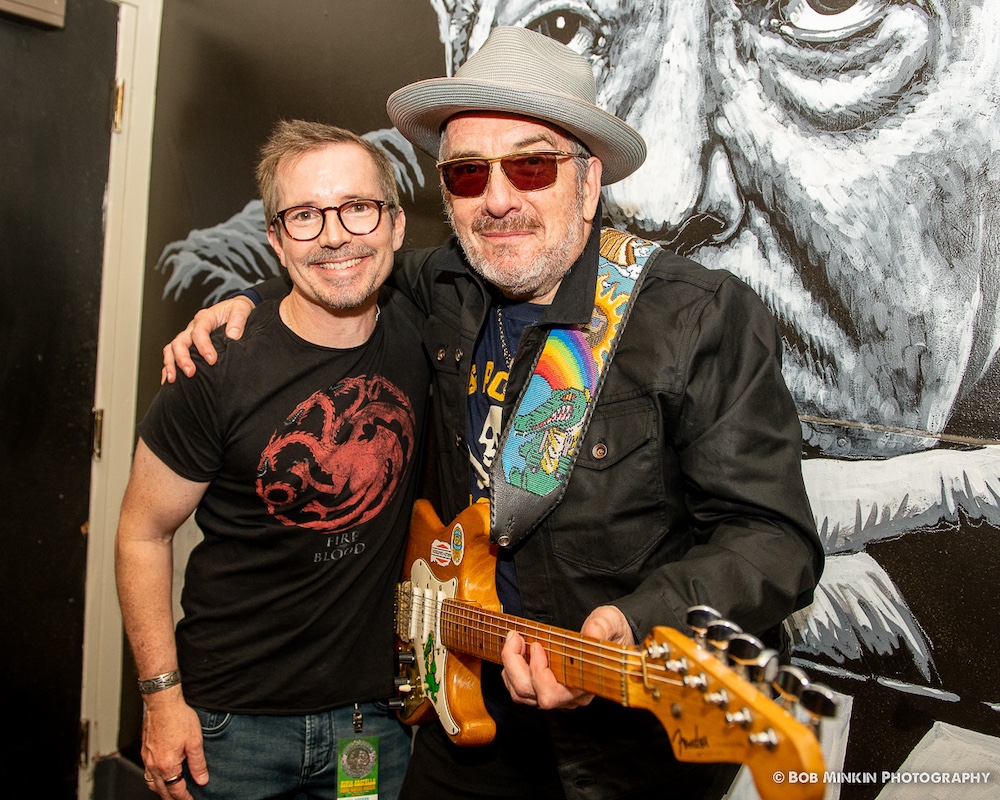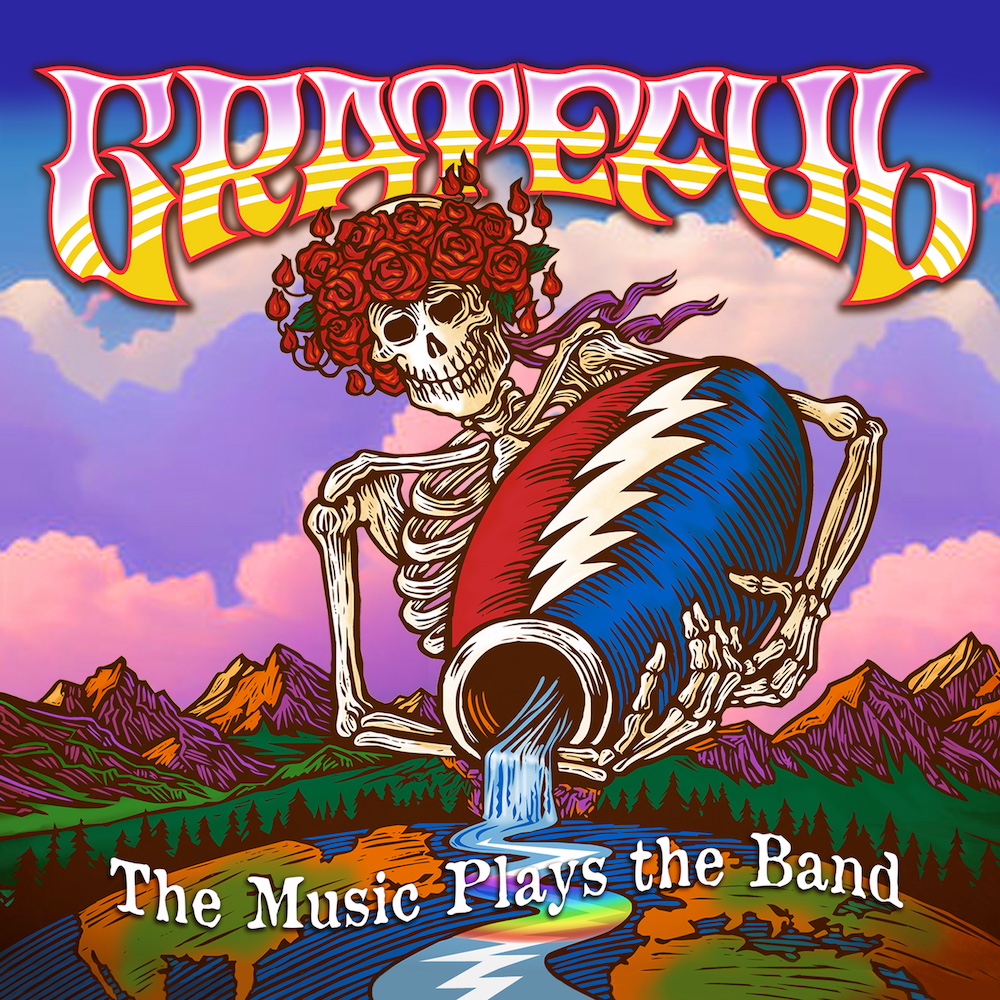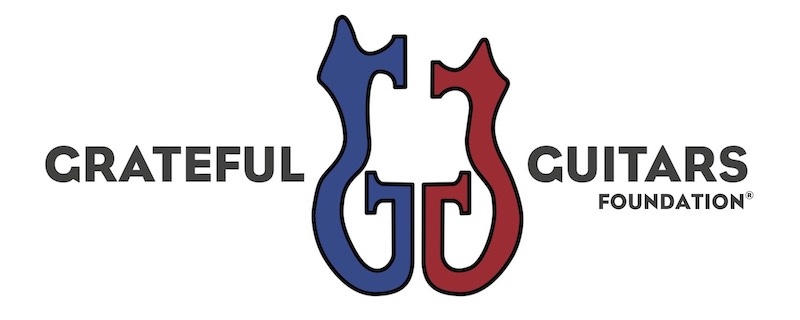Synonyms for ‘grateful’ include thankful, indebted, obliged, and appreciative.
All of which we feel for Jerry Garcia, Bob Weir, Phil Lesh, Bill Kreutzmann, Mickey Hart, and all other members of the Dead, as well as everyone keeping the music and message alive… including Andy Logan.
Even some 30 years after their fateful end, the Grateful Dead still has one of the strongest fan bases the world has ever seen. They are a diverse group of diligent, peaceful people who are in ‘it’ for so much more than the atmospheric sounds of the band. In fact, ‘it’ is the atmosphere that the band itself created by being nothing more than open-minded, open-hearted musicians. Their mission was to spread the love through coming together and jamming. The atmosphere at their shows continues to be irreplaceable and led to Deadheads following the band around on tour for tens to hundreds of shows, chasing the organic high that came with finding yourself in a space filled with peace and equality (as well as myths, music, and psychedelia). The GD world is all-encompassing and life-changing, and to be a Deadhead means seeking out that peace and equality, but also cultivating it. A prime example in the year 2024 is Andy Logan, artistic entrepreneur and founder of the Grateful Guitars Foundation.
Logan’s passion for music doesn’t start and end with the stylings of the Grateful Dead, but with what they were known for, he was inspired to pay homage to them with the new Grateful: The Music Plays the Band album, and from the community that band has offered him, he has been able to help an even broader audience. It was imperative that The Aquarian speak with him as soon as the record was out in the world.

Andy, you may be the founder of the Grateful Guitars Foundation, but you’re also very evidently a fan of the music. What about this band drew you in, and keeps you here?
I first heard of the band as a child when my older step-brother was going to see a show at the Capitol Theater and I was worried for him, as the name sounded so scary. When I was a teenager and had many friends and family who were Deadheads, I became curious. I was blown away by the depth of the band and its huge community of followers. I was especially excited by the iconography and the custom instruments they played. Most rock heroes played a strat or Gibson, and here was Jerry on this amazing Doug Irwin Tiger. It was clear the band was so much more than its music and it was super exciting reading The Official Book of the Deadheads in my sophomore and junior years when I was getting into the band. I did a deep dive of all the albums and really enjoyed them, despite people saying they were not what the band was about.
My first bootleg was 5/8/84 and it blew me away, especially the spaciousness and dreamy qualities of the “Looks Like Rain.” Musically, the improvisation grabbed me, as it was evident how different the bootlegs were from the albums and then how each bootleg was different. The lyrics were also a huge draw as they are pure poetry – just as important was the community. My parents had divorced when I was four years old in 1974, and I had lived through a couple of marriages and lots of intensity and drama. I was raised in Greenwich and New Canaan, Connecticut – both super conservative areas. It was very clear that the Grateful Dead community offered a fun, exciting, non-judgmental alternate reality that was exactly what I was seeking. It was my new home and it has been home for me – and so many of my friends – ever since.
As a psychotherapist, I believe Garcia, and subsequently the band and crew, created a community where every member could be themselves in an inclusive space and free from judgment. They built a space for like-minded people to get together and enjoy the music and each other. They spawned many cottage industries where the main driver is passion, and that was infectious and motivating for many to pursue their dreams, in spite of schooling or traditional barriers. This sixties ethos clearly has continued to be in high demand, as there are now more Deadheads than ever before. My wife and I support this music and community because we see it as a model for all of humanity, especially in these increasingly divisive times. The community breeds genuine connection, acceptance, inclusivity, kindness, service and love for all beings. As a result, we want this ethos to thrive and grow and serve as a model for all humans to coexist in harmony.



Photos by Becky Logan
No matter how many studio albums and songs the Grateful Dead released, they were a live band and a communal experience at the end of every day. Why do you think they resonated, and continue to resonate, so strongly on stage in front of an audience?
Because Jerry Garcia allowed the tapers to share the bootlegs, the music spread far and wide. He famously said, “They can have it when we’re done playing.” That was a groundbreaking decision that many lawyers likely bristled against, but it is an amazing example of long-game thinking. Heads shared the tapes and that begat more heads. By the time I saw my first show in April of 1988, I knew exactly what to expect from Bobby and Jerry taking turns, to Drums/Space, the encores, and general ebbs and flows of a show. This also created word of mouth where fans were comparing certain versions of songs versus other versions between tours and years.
As the obsession grew, fans became as much a part of the show as the players. Fans hung on every note and laughed when mistakes were made and even cherished the uniqueness of mistakes, as they became a part of that special show. From a psychology perspective, I believe that fans’ deep focus on the music was healing and transformative. When we have deep focus on something, we get a mini-vacation from our troubles, which is healing and refreshing. Additionally, live shows with elaborate jams allow our minds to reflect, which can help us reframe traumas or negative emotions. If I reflect on a difficult experience at a show, my ego is diminished and I am more likely to look at the memory from a unique perspective, and that is likely to be more positive and thus healing, so when I reflect on the memory again, I am remembering the event and my new positive take on it going forward, which is transformative. Of course, there are some that fell into the pitfalls of addiction, yet the bulk of us have been opened up and healed through the shows and that is why we keep going back. A fan appreciates that every night the show will be different, even if they’ve seen the same songs a few nights prior. They know the new jams will potentially be exciting, healing, and fun, and they will enjoy it in a community of like-minded travelers all enjoying being present and in the moment together.
How did you get involved with being a beneficiary of the album? And is your love, respect, and reasons to the latest two questions the man reasons that you wanted to embark on this project with ALP, the artists, the benefit concert, release, and everything in between?
After working in high-tech for two successful start-ups, S3 and Nvidia, I chose to go back to school to get a graduate degree in psychology and become a Marriage & Family Therapist and have been doing that for over 20 years. While that has been rewarding work, I also had a deep passion for music and the GD community. In 2008, I started collecting GD guitars and eventually loaning them out to bands and players in 2013. It was very evident that the players often did not have the tools they needed, so we started gifting guitars in 2016. It was clear that the guitars we loaned or gifted were very inspiring to the players and that inspiration lifted up their playing, which was quickly noted by the fans who mirrored that back to the stage, lifting up the players even more, so it was and has continued to be an exciting feedback loop.
From my background in psychology, it was clear how the community, the music, the lyrics all were part of a healing slice of life that could grow and be even more impactful. We launched Grateful Guitars in 2019 to make this operation larger and more impactful. We’ve gifted dozens of instruments and pieces of gear that have brought joy to countless humans. While I could be of service to a select group of clients in psychotherapy, I could impact even more humans by spreading the GD ethos of love, inclusivity, kindness, and respect for all via Grateful Guitars.
This album is a result of our connections to countless jam bands we’ve worked with over the years. As Steve Liesman said, ‘there is something about the Grateful Dead’s music that makes you want to play this music.’ I also play guitar and jam with buddies, as the catalog offers so much room for one to explore. The bands playing this music can follow varying periods of the Grateful Dead or they can take the music to an entirely new place and that fascinating delta is evident on our Grateful album. The Garcia family shared that Jerry started a conversation and that it’s up to us to continue this conversation; the Grateful album is just one of many current chats in our scene for us to gratefully explore.

Oteil Burbridge and Dark Star Orchestra are two of the more notable names on the lineup of talent that Grateful: The Music Plays the Band hosts. being that they are so very much ingrained in the world of the Dead, what do they bring to this in particular?
Oteil Burbridge brings validation to any musical endeavor he touches. I first saw him playing with the Allman Brothers. Oteil is a deep human with unreal skills, so his choice to put himself into this music is entirely additive, and it justifies our insatiable pursuit of the next show. Go check out Oteil’s journey to record his album and all the old magic he encountered. Like so many GD stories, it is deep and full of wonder.
Dark Star Orchestra set out to give fans the Grateful Dead show experience from eras that were passed, which was magic to my ears. As a fan of the late eighties and then post-Brent years, DSO has allowed me to experience what it would have been like to see a 1960s or Europe ’72 or spring ’77 show. DSO members know the catalog so well, and its members saw the original band from the early seventies and on, so they really know how to give the people what they want. I like to say that nobody does the big sound of the Grateful Dead better than DSO, and I am joyfully reminded of that fact at every one of their shows. Like the originals, they have played together for so long that they can anticipate each other and fill unique spaces in the music without ever stepping on each other – just like the Grateful Dead! I want to add that DSO and their crew are amazingly kind and are exceptional examples of the GD ethos, and their annual Jubilee is an example of the success of such a vibe, as they have never had a violent incident there.
In closing, I love that we have Oteil’s haunting fresh take on “Stella Blue” and that we also have DSO’s pitch perfect “Jack Straw” and “Morning Dew” to open and close this album.
A large part of this compilation record, which dropped on May 24, is the musicianship – literally and figuratively. Not only are these artists and bands paying tribute to the sounds of the Dead, but they are also playing the instruments that the Dead crafted these songs on. How does one go about choosing what acts are to come in and take part in such a special, honorable album like this one? Similarly, did you or any of the producers on this record hand-pick certain songs for certain musical contributors? Or did some people come in knowing what Grateful Dead song they wanted to record and re-imagine?
The music on the album was selected by our team, which consists of Jack Barton, Ellie Sanders, and me. We started by asking a large group of bands that play this style of music and many jumped on the idea, so we had plenty to choose from. We also wanted to ensure we had different takes on the music, so Ellie identified some super fresh acts that you see on the project. We allowed bands to offer their “best” and then went about making a setlist, loosely in the flow of a Grateful Dead show. As Heads, we knew DSO has done killer “Jack Straw”s and “Morning Dew”s. We also knew about the new takes coming from bands like La Horsa Bianca and Doom Flamingo and Afro Dead. I want to thank Rob Eaton, of DSO, for mastering all the music. In addition to his arduous DSO tour schedule, Rob has given so much to the fans of this music through his audio engineering and preservation work. The entire lineup on the album is inspiring and hopefully excites fans and leads to new musical conversations.
On that same note, were there any artists or songs that didn’t make the cut, for some reason or another? It’s not a short record by any means with a tracklist of 17. Still, do you have any dream contributors if another compilation comes to be?
There are no cutting room stories, though we’re already excited about more. After seeing both play at DSO’s Jubilee, Daniel Donato and Sam Grisman would crush on a second Grateful album. I’d also love to add music from Stu Allen, Zach Nugent, Mik Bondy, Sunshine Becker, and so many more amazing Grateful Dead bands out there.

The Grateful Dead is a family, the Company is real, and the Deadheads are united. How does the band, and your foundation, spread the love and life force of music? How can other people, maybe non-musicians or more casual Dead fans, give back to the community – whatever their chosen community is – and support local arts?
Grateful Guitars Foundation spreads the ethos of the Grateful Dead by supporting the arts through gifting guitars and instruments and, this year, musical instruction to inspire and enliven our community so it lasts in perpetuity. I love to say we will know we’re making progress when there is a Wolf guitar in every bar.
The fact is that music is healing for all humans, players or not; music helps everyone become more present and less egocentric and more open to ideas and each other. If humans are to survive, we need to wake up to address the complex problems we are facing. There has been too much focus on individualism and corporate success. As we have moved away from selflessness and service, all beings have suffered. To make real change, we need to get back to our roots of collaboration and selflessness in service of the greatest good. The arts open us up and inspire us to think anew. As a result, we need to ensure that schools always expose young people to music. We need to ensure that musicians have the tools they need to make inspiring music. We need to protect the ethos of service and selflessness that inspired the Grateful Dead, an entity that has been proven to be “built to last,” because it offers an elixir for all to be our best selves, all together, and for that we are entirely grateful and it is our duty to pass that on to future generations.
YOU CAN STREAM THE NEW COMPILATION TRIBUTE, GRATEFUL: THE MUSIC PLAYS THE BAND, NOW! FOR MORE ON GRATEFUL GUITARS & HOW THEY GET INVOLVED WITH THE ARTS & COMMUNITY BENEFITS, VISIT THEIR WEBSITE!



